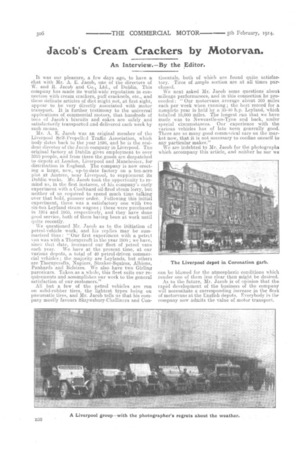Jacob's Cream Crackers by Motorvan.
Page 4

If you've noticed an error in this article please click here to report it so we can fix it.
An Interview.—By the Editor.
It was our pleasure, a few days ago' to have a chat with Mr. A. E. Jacob, one of the directors of W. and R. Jacob and Go., Ltd., of Dublin. This company. has made its world-wide reputation in connection with cream crackers, puff craeknels, etc., and these delicate articles of diet might not, at first sight, appear to be very directly associated with motor transport. It is further testimony to the universal applications of commercial motors, that hundreds of tons of Jacob's biscuits and cakes are safely and satisfactorily transported and delivered each week by such means.
Mr. A. E Jacob was an original member of the Liverpool Self-Propelled Traffic Association, which body dates back to the year 1896, and he is the resident director of the Jacob company in Liverpool.. The original factory at Dublin gives employment to over 3000 people, and from there the goods are despatched to depots at London, Liverpool and Manchester, for distribution in England. The company is now erecting a Large; new, up-to-date factory on a ten-acre plot at Aintree, near Liverpool, to supplement its Dublin works. Mr. Jacob took the opportunity to remind us, in the first instance, of his company's early experiment with a Coulthard oil-fired steam lorry, hut neither of us required to spend much. time talking over that bold, pioneer order. Following this initial experiment, there was a satisfactory one with two six-ton Leyland steam wagons ; these were purchased in 1904 and 1905, respectively, and they have done good service, both of them. having been at work until quit e recently. We questioned Mr. Jacob as to the ihitiation of petrol-vehicle work, and his replies may be summarized thus : " Our first experiment with a petrel van was with a, Thornycroft in the year 1908 ; we have, since that date, increased our fleet of petrol vans each year. We have at the present time, at our various depots, a total of 10 petrol-driven commercial vehicles ; dm majority are Leylands, but others are Thornyerofts, Napiers, Straker-Squires, Albions, Panhards and Belsizos. We also have two Girling parcelears. Taken as a whole, this fleet suits our requirements and accomplishes our work to the general satisfaction of our customers."
All but, a few of the petrol vehicles are run on solid-rubber tires, the lightest types being on pneumatic tires, and Mr. Jacob tells us that his company mostly favours Shrcwsbury-Challiners and Con
tinentals, both of which are found quite satisfactory. Tires of ample section are at all times purchased.
We next asked Mr. Jacob some questions about mileage performances, and in this connection he proceeded: " Our motorvans aVerage about 300 miles each per week when running ; the best record for .a complete year is held by a :35-40 h.p. Leyland, which. totalled 16,000 miles. The longest run that we have made was to Newcastle-on-Tyne and back, under special circumstances. Our experience with the various vehicles has of late been generally' good. There are so many good Comme.rica,1 cars on the market now, that it is not necessary to confine oneself to any particular maker." We are indebted to Mr. Jacob for the photographs which accompany this article, and neither he nor we can be blamed for the atmospheric conditions which render one of them less clear than might be desired.
As to the future, Mr. Jacob is of opinion that the rapid development of the business of the company will necessitate a corresponding increase in the fleet of motorvans at the English depots. Everybody in the company now admits the value of motor transport.


































